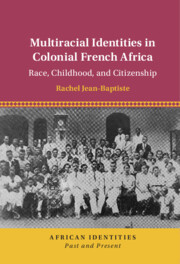Book contents
- Multiracial Identities in Colonial French Africa
- African Identities: Past and Present
- Multiracial Identities in Colonial French Africa
- Copyright page
- Contents
- Figures
- Tables
- Acknowledgments
- Introduction
- 1 Multiracial Identities and the Consolidation and Subversion of Racialized French Colonial Rule in French West Africa and French Equatorial Africa, ca. 1900–1930
- 2 Wards of the State
- 3 “I Am French”
- 4 “Odd Notions of Race”
- 5 Humanizing Maternal and Child Welfare in Dakar, 1949–1956
- 6 Multiracial Internationalism
- Epilogue
- References
- Index
6 - Multiracial Internationalism
Racial Equality, Human Rights, and Just Eurafrican Futures, 1957–1960
Published online by Cambridge University Press: 25 May 2023
- Multiracial Identities in Colonial French Africa
- African Identities: Past and Present
- Multiracial Identities in Colonial French Africa
- Copyright page
- Contents
- Figures
- Tables
- Acknowledgments
- Introduction
- 1 Multiracial Identities and the Consolidation and Subversion of Racialized French Colonial Rule in French West Africa and French Equatorial Africa, ca. 1900–1930
- 2 Wards of the State
- 3 “I Am French”
- 4 “Odd Notions of Race”
- 5 Humanizing Maternal and Child Welfare in Dakar, 1949–1956
- 6 Multiracial Internationalism
- Epilogue
- References
- Index
Summary
Chapter 6 examines multiracial internationalism as conceptualized by the International Union of Métis (IUM), its founder Nicolas Rigonaux, and a global network of allies in Europe, French Africa, and elsewhere in the 1950s. These were twilight years of French colonial rule. The IUM’s dual pillars of mobilization and collective action focused on childhood and citizenship, in alignment with what métis organizations in Africa had long supported. Yet the meanings and claims ascribed to these concepts changed between 1957 and 1960. Multiracial internationalists struggled against racism and racial oppression, whether perpetuated by “blacks,” “whites,” or “others.” The shared identity of birth from a white and “other” parent constituted a distinct form of transnational kinship, which could build bridges to international peace and the realization of universal human rights. Multiracial people were kin whose transnational citizenship entailed civic, social, and humanitarian action for the prosperity of African and other subjugated societies. The multiracial subject would guide African societies to a new relationship with France, healing the racial trauma of colonialism and helping develop African societies, thus fostering a mutually beneficial future.
Keywords
- Type
- Chapter
- Information
- Multiracial Identities in Colonial French AfricaRace, Childhood, and Citizenship, pp. 235 - 280Publisher: Cambridge University PressPrint publication year: 2023

